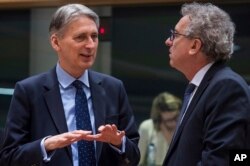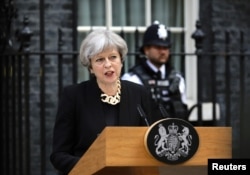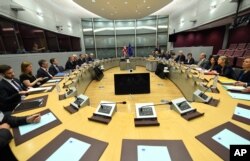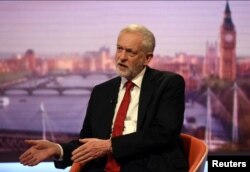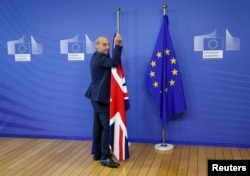Rifts are widening in Theresa May’s Cabinet over Brexit with two rival schools of thoughts emerging, one favoring a sharp break with the European Union and the other, led by the ruling Conservatives’ increasingly influential Chancellor of the Exchequer Philip Hammond, wanting closer ties with the European bloc.
The mounting tensions are emerging as surveys suggest British voters are becoming more skittish over Brexit, possibly a reflection of increasingly bad news about the British economy, which is the worst performing major economy.
According to a YouGov poll, 60 percent of Britons believe trade with Europe should take priority in the departure negotiations with the bloc, rather than immigration issues, thought to be a key driver of the Brexit vote a year ago.
Rising public concern about post-Brexit economic prospects comes amid signs that Britain will need to improve the skills of its own workers rapidly or make better use of robots in manufacturing and assembly plants, as it could be faced with a crippling skills shortage.
The consultancy firm Deloitte found in a survey last week that 47 percent of highly skilled workers from other European countries are thinking of leaving. It warned that if they do, there will be a serious implications for employers.
“Overseas workers, especially those from the EU, tell us they are more likely to leave the UK than before,” said David Sproul of Deloitte.
The split within the upper echelons of the ruling Conservatives over Brexit has gotten sharper since last month’s inconclusive elections that left May weakened and her party remaining in government thanks to a voting deal she made with 10 Northern Ireland lawmakers to give her a slight working majority in the House of Commons.
Few analysts believe May will see out the year before she has to step down and is replaced. The battle is playing out in public with key ministers taking swipes at each other over how Britain should leave the European Union, adding to the sense of a government in disarray.
Hammond has warned that “petty politics” must not be allowed to “interfere with economic logic”, while the minister charged with overseeing Brexit negotiations with Brussels, David Davis, has remained firm that Britain should leave by March 2019 both the single market and customs union. It could remain in both, if London agreed to pay into the EU budget and accept the principle of free movement of labor.
The stark division within the party was illustrated Tuesday when a 2010 video surfaced of Conservative lawmaker Steve Baker speaking to a Libertarian Alliance gathering. Baker, a junior minister and a member of Davis’s Brexit negotiating team, branded the European Union as an “obstacle” to world peace and “incompatible” with a free society. He argued it should be “wholly torn down.”
That is not the position of most Conservative lawmakers, but reflective of a hard-core minority who are propping up May, fearful that if she goes Hammond would probably be the most likely to replace her.
Moderate backbench Conservative lawmakers have been reaching out to opposite numbers in the Labour and Liberal Democrat ranks to try to plot a parliamentary way forward to block a so-called hard Brexit and to fashion one that would allow Britain to retain membership of the Single Market and Customs Union. They are not being helped by Labour’s hard-left leader Jeremy Corbyn, who is presiding over a party almost as divided as the Conservatives over Brexit.
Labour’s position isn't clear, it campaigned last month as a Brexit party that wants to withdraw Britain from the Single Market, doing so because it feared desertion by working-class voters angry over the large number of immigrants working in the country. Corbyn has talked since about wanting a jobs-focused Brexit, but has punished 49 Labour lawmakers who ignored him last week and supported a rebel amendment calling for Britain to stay in the single market and customs union.
European officials say with the incoherence underlining British politics they are becoming increasingly fearful that Brexit negotiations will collapse, leaving Britain exiting Europe with no trade deal.
They aren't the only ones worried. This week the director of the Leave campaign during last year’s referendum, expressed grave doubts about Brexit. In a Twitter exchange Dominic Cummings said he feared a debacle in the EU negotiations and admitted the referendum had been a “dumb idea.” Leaving the European Union could be an error, he said.





